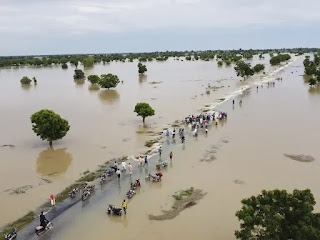Climate scientist, Peter Kalmus, writing in the Guardian today, urges us to understand the scale of the climate emergency [1]
“Climate breakdown is far more intense in 2022 than even many scientists expected, yet the world still isn’t treating this like a crisis”
And as part of the explanation he mentions the following statistics, “About 80% and 15% of global heating is due to the fossil fuel and animal agriculture industries, respectively”
Clearly government responses are needed in order to address a problem of this size, and we should be doing all that we can to ensure that governments get the message and act effectively.
But it also seems to me that here is a compelling reason to take up a plant based diet: 15% of global heating is due to the animal agriculture industry.
What are the consequences of continuing with these industries? Is there any urgency to close them down?
Kalmus considers a few of the recent disasters which are increasingly driven by global heating: the huge floods in Pakistan, the record extreme heat, fires, and drought that have hammered arid subtropical regions such as California, Spain, China and elsewhere this summer, the disintegration of glaciers in Europe, and Hurricane Ian that has just pummeled Cuba and Florida
Others can be added to these such as the ongoing drought in the Horn of Africa (Ethiopia, Kenya and Somalia), Typhoon Nanmadol in Japan, Typhoon Noru in Vietnam, floods in Italy, floods in Nigeria, and the record breaking summer temperatures in the UK.
“In short, it has been a summer of climate insanity. But even so, this will be, on average, the coolest summer with the least climate chaos for the rest of your life. That is just the nature of trends. It should be terrifying.”
Some Numbers
The article mentioned animal agriculture as a cause of global heating. The table below shows the quantities of Green House Gas pumped into the atmosphere by consuming meat compared with alternative plant based sources of protein. The differences are significant. Mike Berners-Lee has calculated the CO2 equivalent associated with one kilo of a number of food products. [2]
For example …
Tofu (meat-free protein source) 1.5 kg CO2
Quinoa (meat-free protein source) 1.6 kg CO2
UK produced chicken 3.8 kg CO2
UK produced beef 25.0 kg CO2
Beef steak from deforested land 83.0 kg CO2
Although there is some uncertainty over the exact values, it is clear that there are very large differences between meat and non-meat foods.
An article, Reducing Our Environmental Impact, highlights research from the University of Oxford which found that cutting meat and dairy products from the diet could reduce an individual’s carbon footprint from food by up to 73 per cent [3]
Food accounts for 10-30% of a household’s carbon footprint, so we could be cutting around 1.8 tonnes each per year by moving to a plant-based diet.
When the consequences of continuing to pump Green House Gases into the atmosphere are so dire then it seems to me that the only reasonable response is to take up a meat and dairy free diet.
References
[1] https://www.theguardian.com/commentisfree/2022/oct/01/climate-emergency-hurricane-ian-crisis
[2] https://www.bbc.co.uk/food/articles/carbon
[3] https://www.independent.co.uk/life-style/health-and-families/veganism-environmental-impact-planet-reduced-plant-based-diet-humans-study-a8378631.html
